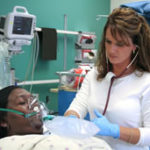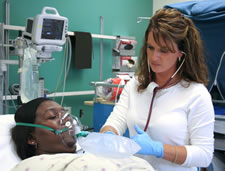
From its modest headquarters nestled in an Albany business park, Excelsior College has become the largest nursing school in the nation.
The school has 16,000 nursing students and, each year, graduates more than 2,000 nurses at the associate, bachelor’s and master’s level, with the majority earning associate degrees.
You won’t see thousands of cars coming and going from its campus on Washington Avenue Extension because Excelsior students take their courses online.
Ninety percent of the students live outside New York state.
While the school is accredited and has received numerous honors, Excelsior has come under fire in many states because its students do not get supervised clinical training — the hallmark of traditional nursing education.
California and Maryland will not license Excelsior’s nursing graduates, and nursing boards in 13 other states have restrictions or additional training requirements for Excelsior graduates.
“It really comes down to philosophy,” said William Stewart, assistant vice president for institutional advancement at Excelsior. “Many of the folks on these boards came through the traditional program and it’s hard for them to understand how can you become a nurse without going through that traditional apprenticeship model.”
The challenges that Excelsior faces in other states are often set off by turf battles from bricks-and-mortar schools trying to keep the online school out of their market, but Excelsior’s critics got a boost in 2005 when the National Council of State Boards of Nursing released a position paper saying education programs for registered nurses should have supervised clinical training.
Stewart said no state has produced evidence that graduates from Excelsior are disciplined at higher rates or perform any worse or better than graduates from traditional schools.
In fact, about 85 percent of Excelsior students pass the National Council Licensure Exam for Registered Nurses (NCLEX-RN), which is on par with the U.S. average.
Thirty-seven states license Excelsior nurses without any restrictions, including New York and Texas.
However, the Texas legislature has ordered the nursing board there to study how well Excelsior and other online nursing graduates perform compared to other nurses.
“In most professional nursing education programs supervised clinical learning experiences are required,” said Mary Beth Thomas, director of nursing for the Texas board, in an email statement. “Excelsior does not require these same experiences.”
Mary Lee Pollard, Excelsior’s dean of nursing and the former director of the Ellis Hospital School of Nursing, agrees that clinical experience is important.
That is why Excelsior only accepts students who have worked in clinical care professions before they enroll. Most Excelsior students are licensed practical nurses who want to become registered nurses, and others are paramedics or military corpsmen. The average age of an Excelsior student is 40.
In order to graduate, Excelsior students must pass a three-day evaluation of their clinical skills in a hospital setting with real patients.
“They have developed a very rigorous evaluation process for students where they come into a hospital on a weekend and they must successfully pass three patient scenarios and they have to pass 100 percent of the clinical lab,” said Glenda Kelman, chairwoman of the nursing department at Sage Colleges.
Kelman served as an evaluator on the Excelsior clinical exam for 20 years and said it was very stringent. About 35 percent of Excelsior’s students fail the exam on their first try, according to Excelsior. Only students that pass are allowed to sit for the national licensure exam.
For students who are too busy or are not interested classroom studies, Kelman said Excelsior is a good option.
Indeed, many nursing school like Sage now offer online courses.
Cynthia McDaniel, 42, of Schenectady, is literally the poster student for Excelsior. She appears in ads and billboards for the school.
McDaniel has three children, works full-time as an RN in Albany Medical Center’s outpatient HIV clinic and is pursuing a master’s degree in nursing at Excelsior.
“The best part of being an online student is having the flexibility of going to school when ever you want,” McDaniel said. “If I can’t sleep at 3 or 4 o’clock in the morning, I can do schoolwork.”
Excelsior was founded in 1971 as a distance learning program for the University of the State of New York. It was called Regents College until 2001 when it changed its name to Excelsior.
The school is accredited by the Commission on Higher Education of the Middle States Association of Colleges and Schools. The school also offers non-nursing degrees and collects more than $60 million annually in tuition and fees.
Even as states were placing additional requirements on Excelsior graduates, the National League of Nursing gave the school its highest honor, naming Excelsior a “Center of Excellence” for promoting student learning and professional development.
Based in New York City, the league is the oldest nursing organization in the United States and has 1,200 nursing schools among its members.
“There are more and more nursing programs online but Excelsior was truly the pioneer in distance education,” said Elaine Tagliareni, chief program officer at NLN. “They set the standards for how it is delivered and how one evaluates competence at the end of a program that is online. They have very strong standards for end-of-program determination of competence.”
Copyright (c) 2011, Times Union, Albany, N.Y. To see more of the Times Union, or to subscribe to the newspaper, go to http://www.timesunion.com. Distributed by McClatchy-Tribune Information Services.
- Extron AV Switching, Streaming, and Control Systems Aid Higher Learning at Idaho’s First Medical School - June 1, 2021
- Extron XTP, Streaming, and Control Systems Empower Point Park University’s Varsity Esports Program - June 1, 2021
- Extron NAV Series Delivers AVoIP Throughout Allied Health Veterans Hall at UNC Wilmington - June 1, 2021

